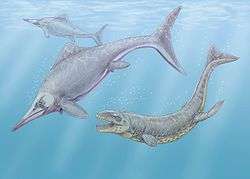Platypterygiinae
| Platypterygiinae Temporal range: Late Jurassic-Late Cretaceous, 155.7–93.5 Ma | |
|---|---|
 | |
| Caypullisaurus bonapartei | |
| Scientific classification | |
| Kingdom: | Animalia |
| Phylum: | Chordata |
| Class: | Reptilia |
| Order: | †Ichthyosauria |
| Family: | †Ophthalmosauridae |
| Subfamily: | †Platypterygiinae Arkhangelsky, 2001 |
| Genera | |
|
†Aegirosaurus | |
Platypterygiinae is an extinct subfamily of ophthalmosaurid thunnosaur ichthyosaurs from the early Late Jurassic to the early Late Cretaceous (Kimmeridgian - Cenomanian) of Asia, Australia, Europe, North America and South America. Currently, the oldest known platypterygiine is Brachypterygius. Platypterygiines were characterized by square tooth roots in cross-section, an extremely reduced extracondylar area of the basioccipital, prominent dorsal and ventral trochanters on humerus and ischiopubis lacking an obturator foramen.[1]
Phylogeny

Platypterygiinae was named in 2001 by Maxim S. Arkhangelsky and dually noted by colleague Aleski Masluk. It is a stem-based taxon defined phylogenetically for the first time by Fischer et al. (2012) as "all taxa closer to Platypterygius hercynicus than to Ophthalmosaurus icenicus". The cladogram below follows Fischer et al. 2012.[1]
| Ophthalmosauridae |
| ||||||||||||||||||||||||||||||||||||||||||||||||||||||
| |
References
- 1 2 Valentin Fischer, Michael W. Maisch, Darren Naish, Ralf Kosma, Jeff Liston, Ulrich Joger, Fritz J. Krüger, Judith Pardo Pérez, Jessica Tainsh and Robert M. Appleby (2012). "New Ophthalmosaurid Ichthyosaurs from the European Lower Cretaceous Demonstrate Extensive Ichthyosaur Survival across the Jurassic–Cretaceous Boundary". PLoS ONE 7 (1): e29234. doi:10.1371/journal.pone.0029234. PMC 3250416. PMID 22235274.
- ↑ Arkhangel’sky, M. S., 1998, On the Ichthyosaurian Genus Platypterygius: Palaeontological Journal, v. 32, n. 6, p. 611-615.